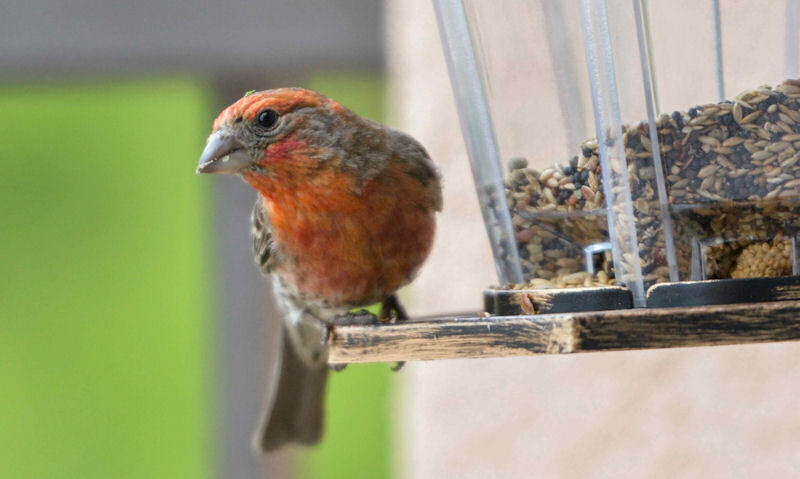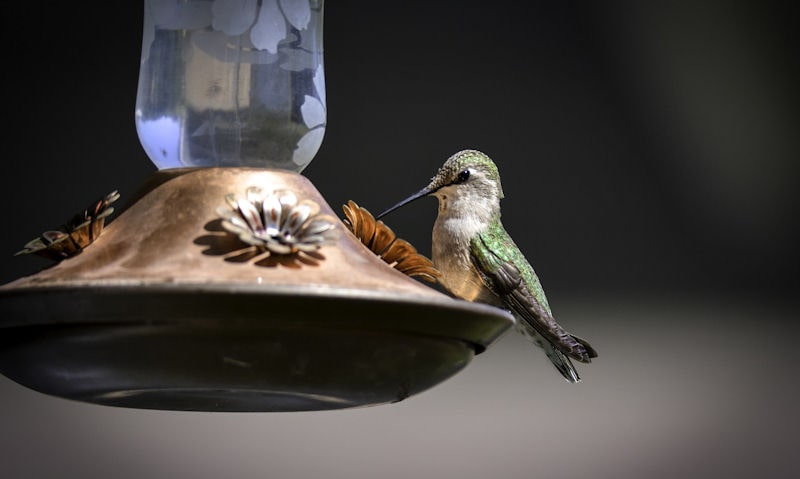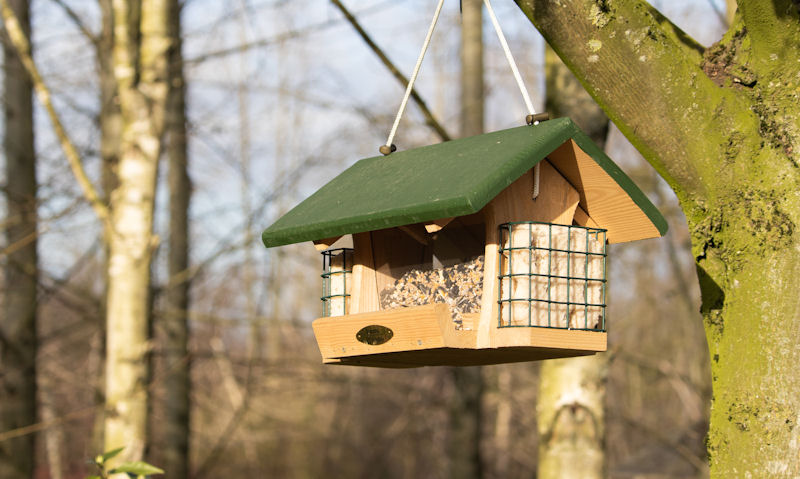How are birds attracted to bird feeders
Do all you can to attract wild birds to bird feeders, although you can increase your chances of success by understanding how wild birds are attracted to them.
How are birds attracted to bird feeders happens when all backyard birds seek out food resources by sight, and sight only. Noise can be a contributing factor with other birds converging on what they know as a food source, yet bird feeders will likely be found by a birds sharp eyesight above all else.
Our most frequent visitors to our bird feeders are what you could call regulars; wild birds who nest near by and therefore are in the vicinity of your bird feeders.
Birds are not attracted to bird feeders because of smell or senses - much like nuisance squirrels or raccoon's are - as wild birds can't smell at all.
Instead, the wild birds who frequent your yard, and so to our bird feeders, will have always been in the neighborhood.
Who knows, just maybe their mother brought these birds to your bird feeders - or to bird feeders near by as fledglings - thus now they've flown the nest, they continue to come back to the same reliable bird feeder location, that so happens to be in your yard.
Birds who visit any bird feeder location will have done so purely by sight, because a birds eyesight is the only way to seek out food when they forage.
Birds if you didn't know remember where bird feeders are and as a result, will return to the same feeders several times a day, and every day of the week, whatever the weather.
Rather than wild birds being attracted to the small of bird feeder food, birds simply have it ingrained in their brains that the presence of bird feeders will usually mean there's bird seeds or other favorites available.
With birds unable to smell or sense bird feed about, they will be seen to visit a bird feeder, in the off chance there's bird food available. Birds won't know there's bird feed present until they come to the feeder, only then will they feed or fly away if there isn't.
Concentrate on attracting wild birds to all types of bird feeders - along with a varied mix of popular wild bird feed - as taking for granted wild birds finding your feeders without effort on your part, could lead to no visiting birds at all.
New bird feeders discovered daily
With all backyard birds unable to smell bird feed, thus can't be drawn to tasty treats or hot food like people or pets can, you must do your best to attract birds to an inviting yet accessible bird feeder location.
Don't be too concerned about wild birds not finding your bird feeders, because they will in time if given half a chance.
Bird feeders are found on a daily basis and as a result your neighbors bird feeders could soon become redundant; that is especially true if you do a good job of suspending accessible, highly visible bird feeders - filled to the rim with popular bird feeder food to steal away the wild birds away from your neighbors
Old and therefore reliable bird feeders will hopefully see a lot of use, while you can attract birds to new bird feeders, almost instantly - but again that will depend on accessibility. Actually, you could have serious competition by a close neighbor without you realizing it.
How exactly wild birds will find your bird feeders is by sight, and sight alone.
Birds fly overhead or will on occasion come to your yard, to simply perch to rest or look at the ground for moving insects and bugs.
Its important when they do to make your bird feeders clearly visible in a sunny location, where the wild birds attention can now be attracted to the well lit up bird feeders.
Attractive foraging grounds
Why wild birds aren't coming to your bird feeders in particular, could be due to the simple reason of your backyard not being favorable to what wild birds expect of natural foraging grounds.
Birds who feed on the ground do so on wide open lawns where they feed on seeds of weeds and grasses, which also means it will be the same seed-eating birds who will forage for insects like spiders, also found in the lawn.
Now let's assume you don't have any kind of lawn or turf in your property, while the idea of attracting birds to your yard naturally will be unthinkable at this time and completely out of the question - although that will be until a lawn is laid or a tree is planted.
Best way to attract birds to a yard regardless of no natural vegetation, grass or trees, will come with a bird feeder, even if the location isn't really desirable.
So you see birds aren't really attracted to bird feeders in what is seen as a concrete jungle - usually in a built up town or city location - as oppose to lush suburban yards close to woods or fewer trees, open fields and public parks.
Its not too late to make your property more attractive to wild birds by laying or growing a lawn, including the possibility of planting trees or bushes you can buy at a garden center.
When noisy birds converge
I have established your common backyard birds will be attracted to bird feeders not by smell or senses, but only by sight.
Birds have a remarkable eyesight and will seek out a bird feeder when found by sight, which really depends on a little luck on your part.
How else you can expect wild birds to find a new or old bird feeder location, is when wild birds before them converge on the feeders. Birds make a lot of noise at feeders - due to dominance around a food source - thus wild birds can be attracted from some distance away to the commotion at your bird feeders.
Absolutely will wild birds be attracted to other birds fighting in a particular area, because it could mean there's a food source there.
And they won't be wrong, wild birds who visit your bird feeders first thing in the morning will make the most noise, and as a result this will be the busiest time.
While this will refer to Finches and Warblers, to Cardinals and Jays; Hummingbirds will be attracted to a Hummingbird feeder by sight, and sight alone - though sounds of Hummingbirds in the area could draw them into the area.
Neighbors contribution
Believe it or not it might not be your contribution to attracting birds to bird feeders at all, when you could be receiving the benefits of your near neighbors putting in all the effort, and possibly most of the expense.
How birds end up at your bird feeders could be because wild birds are tailing off into your property.
Purely by chance mind, but let's not forget your neighbors may have been utilizing bird feeders much longer than you, and as a result could be far more experienced by now.
Neighbors contribution mustn't be underestimated, because they've done the hard work, now its time to steal their wild birds. How you can do that is first find out exactly what bird feeders, and what bird feed they are using.
Find out where their bird feeders are suspended or placed on, and what exactly the feeders are hung on. Its possible your neighbors will be hanging bird feeders in a tree or on a bracket - yet its more likely bird feeders are hung off a bird feeder pole.
Such location must be replicated in your yard too, where bird feeders are likely being hung in a sunlit area, over the lawn, and close to natural vegetation.
To Summarize
Birds will come to a bird feeder as soon as its spotted by sight. Birds have a sharp eye for food resources, and for those birds familiar with bird feeders - just as bird feeder birds are of course - and so that will be how birds are attracted to feeders.Sure, there's no guarantee a wild bird will visit a newly found bird feeder there and then, but birds are sure to slowly filter in over the course of the day.
Birds cannot smell nor do they have any senses they can use to find food in feeders.
In fact, a birds remarkable eye for spotting tiny insects and bugs crawling in the lawn - which applies to Blackbirds or Bluebirds of many - who will scoop down on to the ground to pick up what they spotted from a high point.
Blackbirds will find worms by foraging around on the lawn - especially after it rains as earthworms breach the surface, so are exposed - whereas Bluebirds will perch higher up, then scoop to the ground to pick up worms that were spotted several feet away.
Most birds like Cardinals or Blue Jays will forage for insects by tipping over leaves or items they know where insects will be available beneath them.
All this is achieved by our backyard birds finding natural bird food by sight.
Its therefore how birds are attracted to all kinds of bird feeders, as soon as one feeder noticed, they could be on it right away. Common bird feeder birds have evolved to know a feeder means a food resource, thus expect food to be available.


